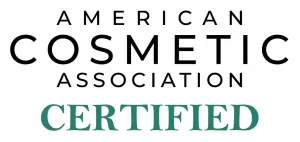Cosmetic products must meet strict safety and quality standards – especially in the beauty industry.
Obtaining cosmetics certification is a smart move for businesses:
- It builds trust with consumers.
- It shows commitment to product safety.
- It helps stay ahead of competitors.
This article will dive into the benefits of cosmetics certification and why it’s crucial for companies to prioritize it.
Understanding Why Companies Should Seek Cosmetics Certification
Benefits of Cosmetics Certifications
Obtaining cosmetics certifications can benefit companies in several ways:
- It helps build brand image and consumer confidence.
- Verifies the quality and safety of cosmetics and other beauty and personal care products.
- Assures consumers that beauty products meet industry standards.
- Promotes trust and credibility.
- Demonstrates commitment to sustainability and eco-friendly practices.
Certifications like Cruelty-Free Vegan Certification and Organic Natural Certification:
- Emphasize specific standards.
- Ensure consumer well-being and product effectiveness.
- Provide peace of mind by avoiding harmful ingredients.
- Offer marketing advantages by differentiating beauty brands.
- Boost reputation and attract eco-conscious consumers.
Certifications are essential for:
- Building consumer trust and confidence.
- Fostering customer loyalty.
- Creating a positive brand reputation in the beauty industry.
Importance of Consumer Trust in the Beauty Industry

Consumer trust is very important for companies in the beauty industry. Certifications are key to ensuring the quality and safety of beauty products, showing consumers that they meet industry standards.
By following specific standards like organic certification and cruelty-free testing, manufacturers can build trust with eco-conscious consumers. Trust is essential for influencing purchasing decisions and improving brand reputation.
Cosmetics companies can set themselves apart by highlighting their commitment to sustainable practices, such as Cradle-to-Cradle certification. This helps attract loyal customers and differentiate them in the market.
Consumer trust is crucial for the growth and sustainability of beauty businesses. It gives consumers confidence in the beauty and personal care products they buy by ensuring their effectiveness, safety, and well-being.
Meeting regulatory requirements, avoiding harmful ingredients, and emphasizing sustainability through certifications like USDA Organic and Leaping Bunny are important for building trust and maintaining a positive brand image in the competitive beauty industry.
Ensuring Product Quality and Safety Through Beauty and Personal Care Product Certifications

Certifications in the beauty industry are important. They help ensure the quality and safety of cosmetic products.
These certifications validate the effectiveness and well-being of beauty and personal care products through specific standards and rigorous testing processes. They make sure harmful ingredients like parabens and sulfates are not included in certified products, promoting consumer safety.
Certifications such as organic certification, cruelty-free labels, and eco-friendly practices show compliance with regulatory requirements and sustainable manufacturing processes.
These certifications not only ensure product quality but also build trust with consumers through transparency and credibility.
Beauty brands can use certifications to stand out, enhance their reputation, and appeal to eco-conscious consumers who value sustainability and health.
Building Brand Image and Consumer Confidence
Certifications in the beauty industry are important for ensuring product quality and safety. They help establish consumer trust.
There are different types of certifications like organic certification, cruelty-free labels, and certifications that confirm the absence of harmful ingredients such as parabens or sulfates.
These certifications show a company’s commitment to transparency, sustainability, and compliance with industry standards. They verify product effectiveness and safety, giving consumers peace of mind about their health.
Certifications also provide marketing advantages by setting beauty brands apart, enhancing brand reputation, and appealing to eco-conscious consumers.
When choosing a certification program, cosmetic brands should look at the standards, regulations, and sustainable practices involved.
By selecting certifications that match their values and production methods, companies can earn consumer trust, increase customer loyalty, and highlight their dedication to eco-friendly beauty practices.
Regulatory Compliance and Certifications
Certifications are important for beauty products. They help with following the rules, keeping products safe, and maintaining high quality.
By getting certifications like cruelty-free, organic, or ACA and USDA Organic, beauty brands can show they care about being clear, sustainable, and caring for consumers.
Certifications check that products don’t have bad stuff like parabens or sulfates. They also support eco-friendly and good practices.
By using certifications, makers can earn trust, build a good brand, and make customers loyal. Customers feel secure about what they buy.
When picking a certification plan, cosmetic makers need to think about rules, standards, tests, and what customers want.
Choosing the Right Certification for Your Cosmetic Brand

Certifications for cosmetic products show that a manufacturer values quality, safety, and sustainability. These certifications, like cruelty-free or organic, highlight a beauty brand’s adherence to specific standards and rules. They ensure consumers that the products are safe to use and produced with eco-friendly methods.
Having certifications helps build trust with customers, who appreciate knowing that the brands they choose prioritize their well-being. It also sets brands apart in a competitive market, appealing to environmentally conscious consumers, and enhancing their reputation.
Choosing the right certification program reflects a brand’s values, sets them apart from competitors, and emphasizes their dedication to quality, sustainability, and transparency in manufacturing.
Cosmetics Certification Programs for Manufacturers
American Cosmetic Association certification programs help ensure the quality and safety of beauty products.
ACA “Organic Natural Certified™” certification is for cosmetics that are made from natural ingredients and are free from harmful chemicals such as parabens, phthalates, and sulfates. Organic Natural Certified cosmetics offer comfort that products are safe for your skin and the environment.
“Green Certified™”: The American Cosmetic Association (ACA) offers a “Green Certified™” certification for cosmetics products that meet certain environmental and social standards.
“Clean Certified™” certification is for cosmetics and beauty products that are made without a list of harmful and toxic cosmeti
“Vegan Certified™” certification is for cosmetics that are free from animal-derived ingredients and have not been tested on animals.c ingredients such as formaldehyde, coal tar, and hydroquinone.
Gold Standard Certified Cosmetics™ certification is the most rigorous and exclusive cosmetics, makeup, beauty product certification worldwide.
These programs verify compliance with industry standards and regulations. They involve testing and criteria related to ingredients, manufacturing processes, and sustainability practices.
By obtaining American Cosmetic Association certifications, manufacturers can build trust with consumers, demonstrate transparency, and stand out in the market. Certifications enhance the credibility of beauty brands and provide marketing advantages.
They attract eco-conscious consumers and promote customer loyalty. American Cosmetic Association certified products meet health and safety requirements, offering consumers peace of mind about their effectiveness and well-being.
FAQ
What are the benefits of obtaining cosmetics certification for companies?
Obtaining cosmetics certification helps companies build trust with consumers, improve product quality, comply with regulations, and expand market opportunities.
How does cosmetics certification help companies build credibility and trust with consumers?
Cosmetics certification helps companies build credibility and trust with consumers by demonstrating their products meet specific standards and regulations.
What potential legal and regulatory risks can companies mitigate by seeking cosmetics certification?
Companies seeking cosmetics certification can mitigate legal and regulatory risks related to product safety, ingredient compliance, and marketing claims. For example, certifications like the EU’s Cosmetics Regulation can help ensure products meet regulatory standards, reducing the risk of legal consequences. In the US, MoCRA by FDA is the regulator.
In what ways does cosmetics certification demonstrate a company’s commitment to product safety and quality?
Cosmetics certification ensures that products meet high safety and quality standards by confirming they are free of harmful ingredients and produced in compliance with regulatory requirements.
How can cosmetics certification help companies access new markets and increase sales potential?
Cosmetics certification can help companies access new markets by meeting regulatory requirements, building credibility with consumers, and showcasing commitment to quality and safety. For example, obtaining ACA and USDA organic certification can open up opportunities to reach environmentally conscious consumers.